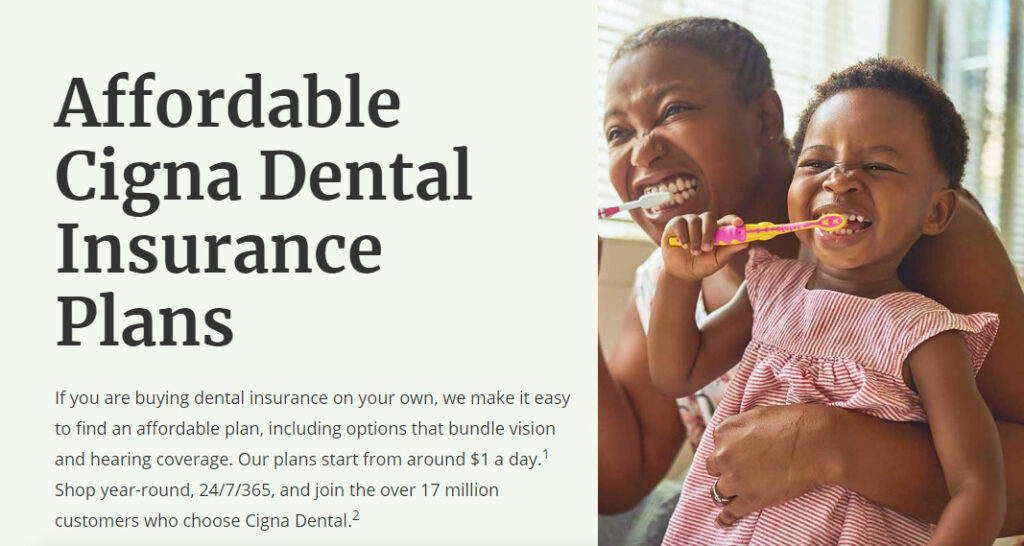| We may receive compensation from partners & advertiser links at no cost to you. Read our disclosure for details. |
Fillings are a common dental procedure used to restore teeth damaged by tooth decay. There are a few things to consider when calculating silver (amalgam) vs white cavity filling costs out of pocket so keep reading.
When you have a cavity, your dentist will remove the decayed portion of the tooth and fill it with a material such as amalgam, composite resin, or porcelain. This helps prevent further decay and restores the tooth’s structure and function.
In this post, we’ll look at white cavity fillings and silver fillings and also make some suggestions on how to save money before your trip to the dentist.
A cavity filling may not break your bank account, but other dental procedures like implants can. If you want to lower your dental costs keep reading.
*This information is not intended to be medical advice. Consult with your healthcare professional if you have questions.
What is a Cavity?
A cavity is a hole or structural damage in a tooth caused by tooth decay. It is a result of the demineralization of the tooth enamel by acids produced by bacteria. Dental cavities need to be treated by a dentist to prevent further damage and infection.
Cavities can occur in any part of a tooth. Cavities behind the lower front teeth are often considered more difficult to treat. Cavities can also affect the front side of your back teeth.
A dental filling is a procedure used to repair a damaged or decayed tooth. When a tooth has a cavity or is cracked, a filling is necessary to restore its structure and prevent further damage.
The process involves removing the decayed or damaged portion of the tooth and filling the space with a dental material, such as composite resin or amalgam.
Cavity fillings are crucial for maintaining good oral health. If left untreated, cavities can worsen over time, leading to more extensive dental procedures such as root canals or even tooth extractions.
By getting a cavity filled promptly, you can save yourself from unnecessary pain and expenses in the future.
The cost of a dental filling can vary depending on several factors, including the location of the tooth, the severity of the damage, and the type of filling material used.
A Dental Exam Can Save You Money
Dental exams are not just about ensuring a bright and beautiful smile; they serve a crucial role in identifying and addressing oral health issues in advance.
Regular check-ups with your dentist can help detect problems early, preventing them from developing into more serious and costly conditions.
In addition, routine dental visits may involve teeth cleaning, which aids in maintaining healthy gums and preventing periodontal diseases.
Maintaining good oral health is essential for overall well-being. Neglecting your teeth can lead to big, expensive problems down the road.
Regular dental check-ups and cleanings, along with proper oral hygiene practices, can help prevent these issues. Without dental insurance, many people avoid getting the care they need because of real concerns about cost.
When it comes to your health, you can pay now or pay later. Taking care of your teeth can save you from potential pain and financial burden in the future.
Understanding silver & white cavity filling costs can help you plan and prepare.
White Cavity Filling Cost (Composite)
White cavity fillings, or composite fillings, are a popular choice for restoring teeth with visible cavities.
The composite resin used in white fillings is carefully matched to the natural color of your teeth, creating a seamless blend that is virtually indistinguishable from the surrounding tooth structure.
Expect to pay $200-$600 without insurance (see below)
This aesthetic advantage makes white cavity fillings an ideal option for front teeth or other visible areas of the mouth.
The composition of white cavity fillings involves a mixture of plastic and glass materials, forming a ceramic and plastic compound. This unique combination makes the filling aesthetically pleasing and highly functional.
During the filling procedure, the dentist carefully places and shapes the composite resin to ensure a perfect fit, effectively restoring the tooth’s form and function.
One of the significant benefits of white cavity fillings is their ability to bond with the tooth structure chemically.
This bonding process not only enhances the filling’s durability but also provides additional support to the tooth, helping to prevent further damage and potential fractures.
With proper care and maintenance, white cavity fillings can provide long-lasting and reliable restoration for your smile.
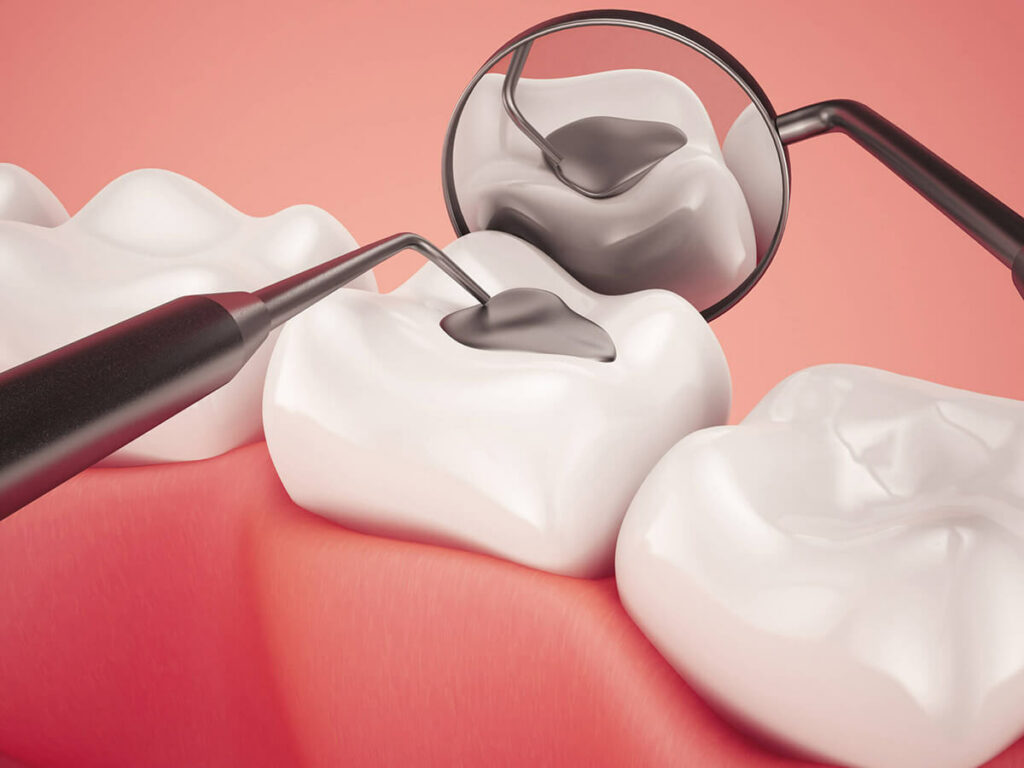
Cavity Filling Cost for a Metal Filling (Silver Amalgam)
Silver cavity fillings, commonly known as amalgam fillings, are renowned for their exceptional strength and durability. They are particularly well-suited for fillings in the back teeth (molars) with the strongest biting forces.
Amalgam fillings are composed of a liquid metal alloy, primarily consisting of silver, tin, and copper, mixed with mercury.
You can expect to pay anywhere from $150-$500 with no insurance (see below).
The unique combination of metals in amalgam fillings creates a sturdy and resilient restoration that can withstand the pressures of chewing and grinding.
This makes them an excellent choice for larger cavities or areas subjected to more significant stress during chewing.
Amalgam fillings have been used in dentistry for decades and have proven to be a safe and effective way to restore teeth damaged by cavities.
However, it’s important to note that some individuals may have concerns about the presence of mercury in amalgam fillings. While dental organizations consider amalgam fillings safe for most patients, some people may prefer to opt for mercury-free alternatives.

Cavity Filling Cost Without Insurance
The cost of your filling will vary based on several factors, such as the type of filling chosen, the location of the tooth, and the extent of the restoration needed. You can expect $200-$600 as the cost to fill a cavity.
Generally, silver cavity fillings tend to be more cost-effective compared to white cavity fillings. However, it’s essential to consider the long-term benefits and aesthetic advantages that white fillings offer when assessing the overall value.
For individuals concerned about the upfront cost, silver cavity fillings may seem like a more attractive option. They are typically more affordable, making them accessible to a broader range of patients.
The lower cost of silver fillings can be particularly advantageous for those without dental insurance or with limited coverage.
On the other hand, white cavity fillings, while initially pricier, may offer better value in the long run.
Their aesthetic appeal and ability to blend seamlessly with natural teeth make them an excellent investment for those who prioritize a beautiful and natural-looking smile.
Note: Most dental insurance plans cover tooth fillings at 65%-80% of the cost (depending on the plan) reducing out-of-pocket expenses for this and other treatments.
When comparing white vs metal cavity filling costs, be sure to consult with your dentist regarding personal preferences, oral health needs, and financial situation.
Your dentist can provide an estimate of the average costs for each type of filling and help you navigate insurance coverage to determine the most cost-effective and aesthetically pleasing solution for your specific dental requirements.
The following is for illustration only. Costs without insurance will vary:
Cavity Filling Cost (no insurance)
| White composite filling (1 front tooth) | $200-$500 |
| White composite filling (2 back teeth) | $300-$600 |
| Silver almagam filling (1 Surface) | $150-$400 |
| Silver amalgam filling (1 Surface) | $250-$500 |
Dental Insurance Can Lower Your Cavity Filling Costs
Having a dental plan can significantly ease the financial burden of dental procedures, including cavity filling costs. Dental insurance plans typically cover preventive services, such as regular check-ups and cleanings.
A primary benefit of dental insurance is its coverage for preventive services, such as regular dental check-ups and cleanings at no cost.
This not only helps detect any potential issues early on but also aids in preventing the development of more serious dental problems that might require costlier treatments.

Additionally, dental insurance will cover the cost of procedures like root canals, dentures, crowns and implants — as well as orthodontia and teeth whitening with select plans.
Investing in dental insurance offers peace of mind and financial security for individuals, ensuring they receive the necessary dental care without worrying about facing exorbitant expenses.
For those looking to safeguard their oral health while being mindful of their budget, dental insurance proves to be an indispensable tool in achieving these goals.
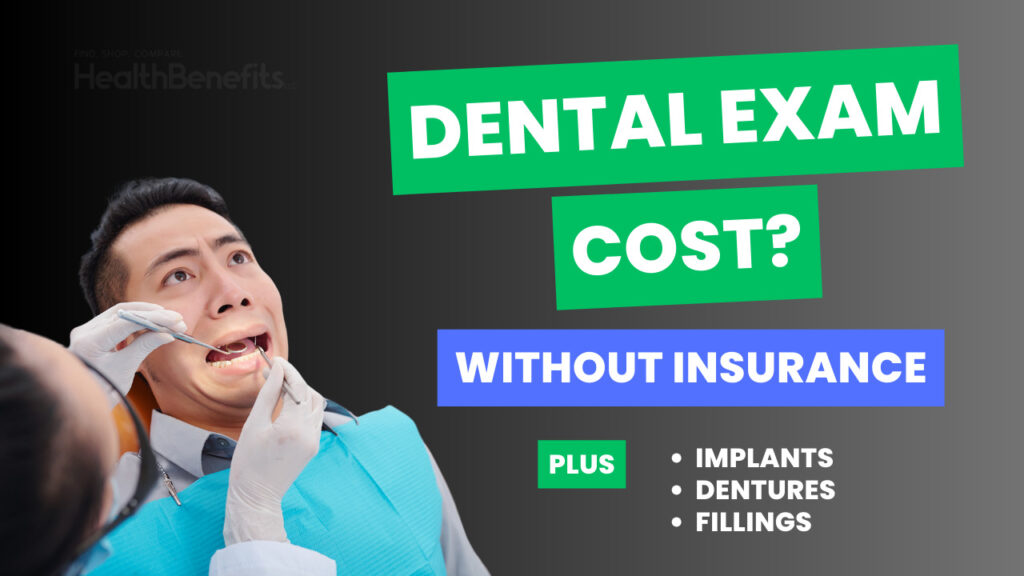
YouTube @HealthBenefitsLLC
Dental Savings Plan
An alternative to dental insurance is a dental discount plan. These savings plans offer reduced rates on dental services, including cavity fillings, for a monthly or annual fee.
To get the most out of a savings plan be sure to visit a network provider and call ahead to confirm your discount.

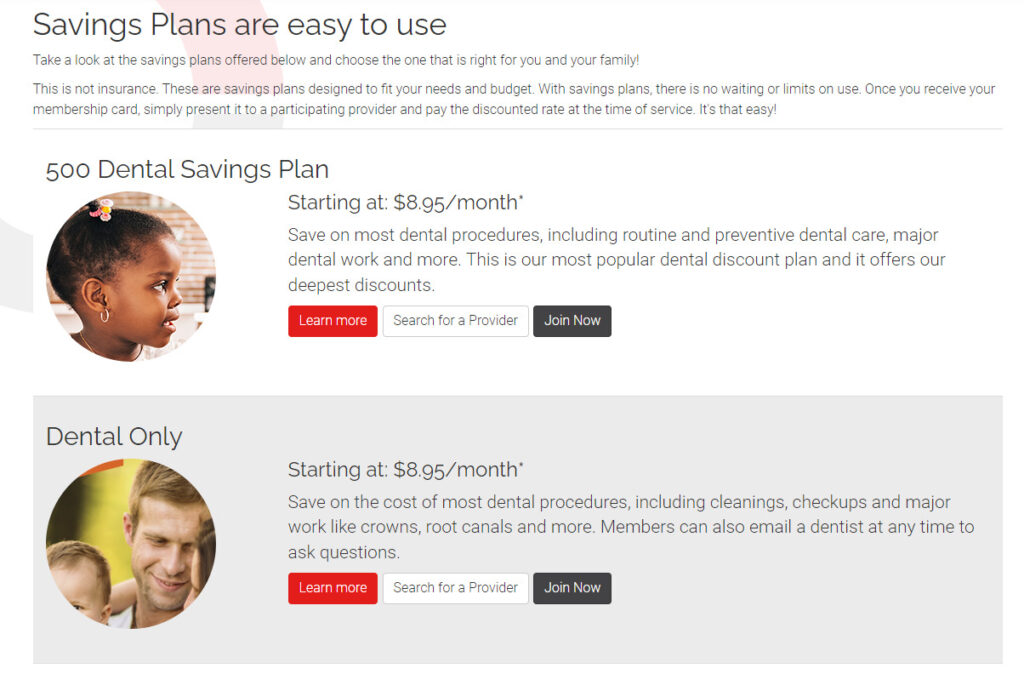
The key to dental savings plans is you must visit a network dentist. Best practice is to search your ZIP Code then call the dental office to confirm benefits and savings before making an appointment.
3 More Ways to Save on the Cost of a Tooth Filling
When it comes to lowering cavity filling costs there are a few tips to keep in mind.
First, consider getting a second opinion.
Different dentists may have different pricing structures, so it’s worth shopping around to find the best deal. Visit a free comparison site like Zocdoc to find and book a dentist in your area.
Additionally, practicing good oral hygiene can help prevent cavities and reduce the need for fillings in the first place.
Brushing twice a day, flossing daily, and visiting your dentist regularly for check-ups can go a long way in maintaining your oral health and saving you money on dental treatments.
While shopping around is always a good idea to get the best price on your dentist visit, there are other ways you can save money. Here are some additional ways to lower your expenses:
1. Prevention and Practicing Good Oral Hygiene
An ounce of prevention is one of the most affordable ways to save on dental costs. Regular dental check-ups and cleanings are crucial for maintaining oral health and catching any potential issues early on.
Brushing twice a day for two minutes, flossing and regular checkups are the most basic steps you can take. If you’re lazy like me, get an electric toothbrush or water flosser! (Amazon)
By preventing dental problems in the first place and addressing them early on, you can avoid more expensive treatments in the future.
2. Dental Insurance or Dental Savings Plans
Another effective way to save on dental costs is to have dental insurance or enroll in a dental savings or discount plan.
Dental insurance can help cover a portion of your dental expenses, including preventive care, fillings, and more extensive procedures like root canals or crowns. Some offer vision coverage as well.
Look for insurance plans that offer good coverage for your specific needs and budget.
A dental savings plan, like Careington 500, provides discounted rates for dental services by partnering with participating dentists. These plans typically require a yearly membership fee, but can provide substantial savings on dental treatments when used as directed.
3. Dental Schools, Clinics and Nonprofits
If money is tight, you can get help and the needed treatment. Some dental clinics and programs offer reduced-cost or free dental services. Search online and call to confirm your eligibility:
- Dental School Clinics – As mentioned earlier, dental schools often offer discounted rates for dental treatments performed by supervised students. This can be a viable option for those without insurance or limited financial resources.
- Community Health Centers – Community health centers often have dental clinics that provide low-cost or free dental services to low-income individuals and families.
- Nonprofit Organizations – Some nonprofit organizations run dental clinics or programs that provide dental care to underserved populations. These organizations may offer sliding-scale fees or free services based on income level.
By reaching out to these resources, you should be able to get the dental care you need at a low cost or even free.
Summary
We hope this information has motivated you to get the treatment you need whether you have dental insurance or not.
Think about it like this, when your car starts making noise there are a few ways to handle that:
- Pretend like you don’t hear it
- Hope it goes away
- Take it to the shop and pray it’s only a minor repair
Your teeth are like that! A toothache might eventually go away, but it’s usually a sign of something that can lead to something bigger.
Understanding the cost of a tooth filling and other dental procedures upfront can help you prepare and find payment options for your oral health needs.
Whether it’s through financing, preventative care, or accessing low-cost dental clinics, there are ways to prioritize your dental health without breaking the bank.
Invest in your oral health now to save you from more expensive and painful procedures down the road.

Ameritas Dental (no waiting period)
Ameritas dental insurance plans feature next-day coverage, no enrollment fees with increasing benefits.
You can add vision and hearing in many states.
There are no waiting periods for all dental services and no enrollment fees when you sign-up online.
Preventive visits, such as dental exams and cleanings, are covered up to 100%.
Fillings and extractions are covered in Basic services. Crowns, implants, dentures and even teeth whitening are covered in select plans.
Online quoting and enrollment.
Additional benefits and options are available such as vision, LASIK, orthodontia, or hearing. Check your ZIP Code for availability.
- PrimeStar Lite
- PrimeStar Boost
- PrimeStar Complete
- Annual maximums from $1,500-$3,000
- Increasing benefits
- Child orthodontia
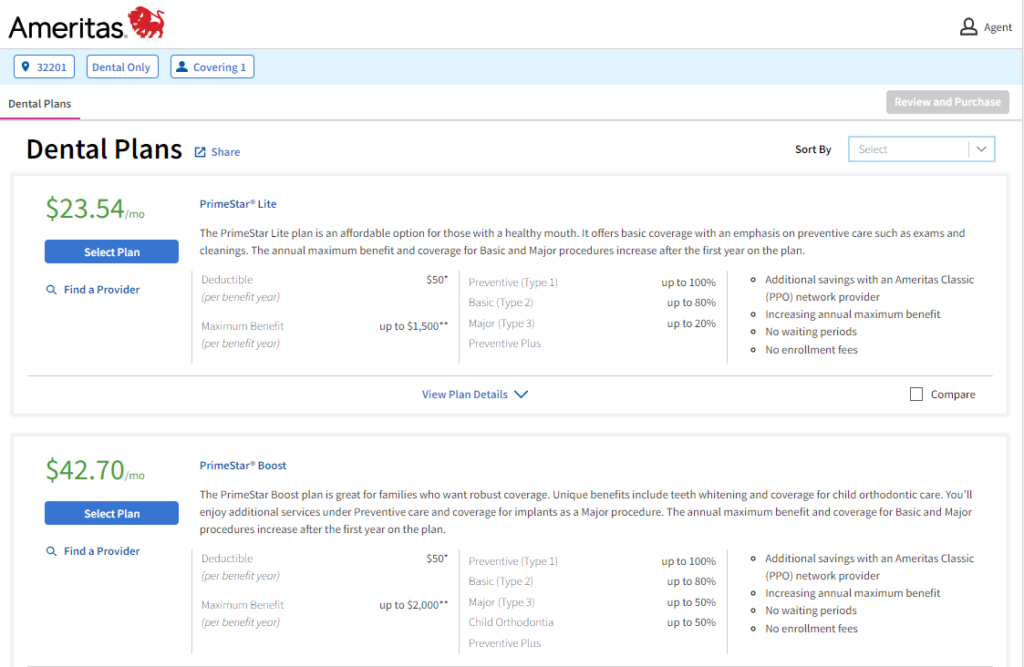
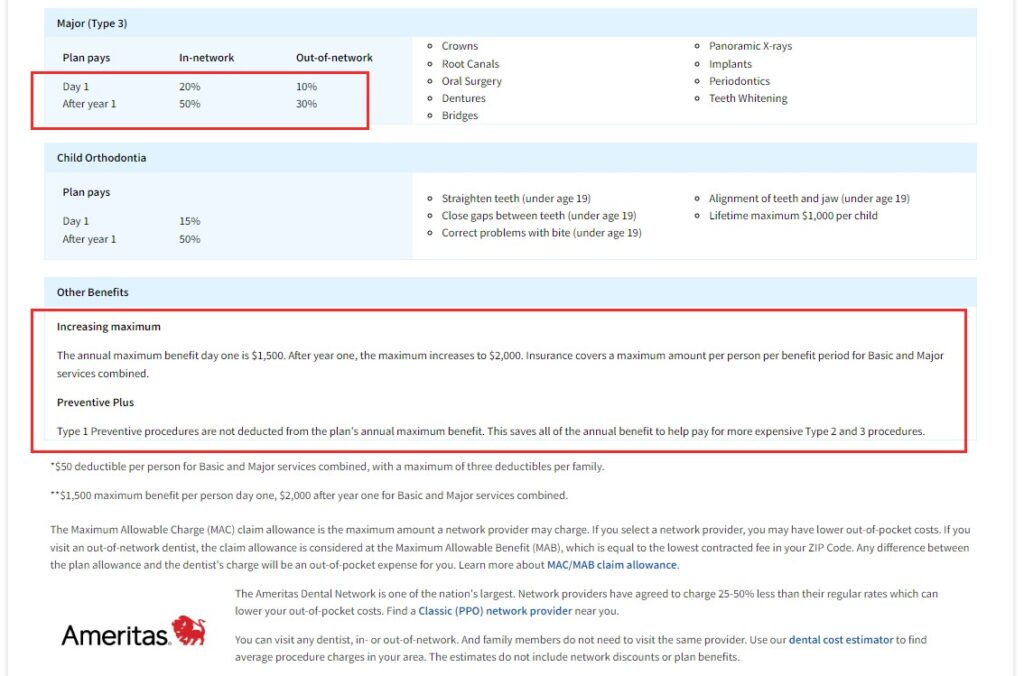

Cigna Dental
Cigna offers individual dental insurance plans along with options for vision and hearing.
Plus, Cigna Dental 1500 offers orthodontia
Get instant quotes on Cigna Dental plans, dental & vision, new high annual maximum plans or dental, vision & hearing bundles.
Online quoting and enrollment. Not all plans are available in all states. Check your ZIP Code >>
- Cigna Dental Preventative
- Cigna Dental 1000
- Cigna Dental 1500 (orthodontia)
- Cigna Dental Vision 1000
- Cigna Dental Vision Hearing 2000
- Cigna Dental 3500


UnitedHealthcare (no waiting period)
From one of the best known names in healthcare, affordable solutions to protect your important assets. Their large network is widely accepted throughout the country.
UnitedHealthcare dental plans provide flexible options for basic and major dental services with no age limit, no waiting period, Day 1 coverage and increasing benefits.
Preventive, basic and major services covered. Annual maximums from $1,000-$3,000.
Popular plans: DentalWise 1000, DentalWise Max 1000 (covers vision) and DentalWise 2000 (covers implants) & DentalWise Max 3000.
DentalWise Max plans include vision. DentalWise 2000 covers implants with a separate $1,500 benefit (12-month waiting period applies to implants. No waiting period on all other services)
Online quoting and enrollment are available in licensed states. Contact us for assistance or if your state is not listed:
DC, FL, GA, MD, MS, NC, PA, TN, TX, VA.
- DentalWise 1000
- DentalWise Max 1000 (& vision)
- DentalWise 2000 (covers implants with additional $1,500 benefit)
- DentalWise Max 2000 (& vision)
- DentalWise Max 3000

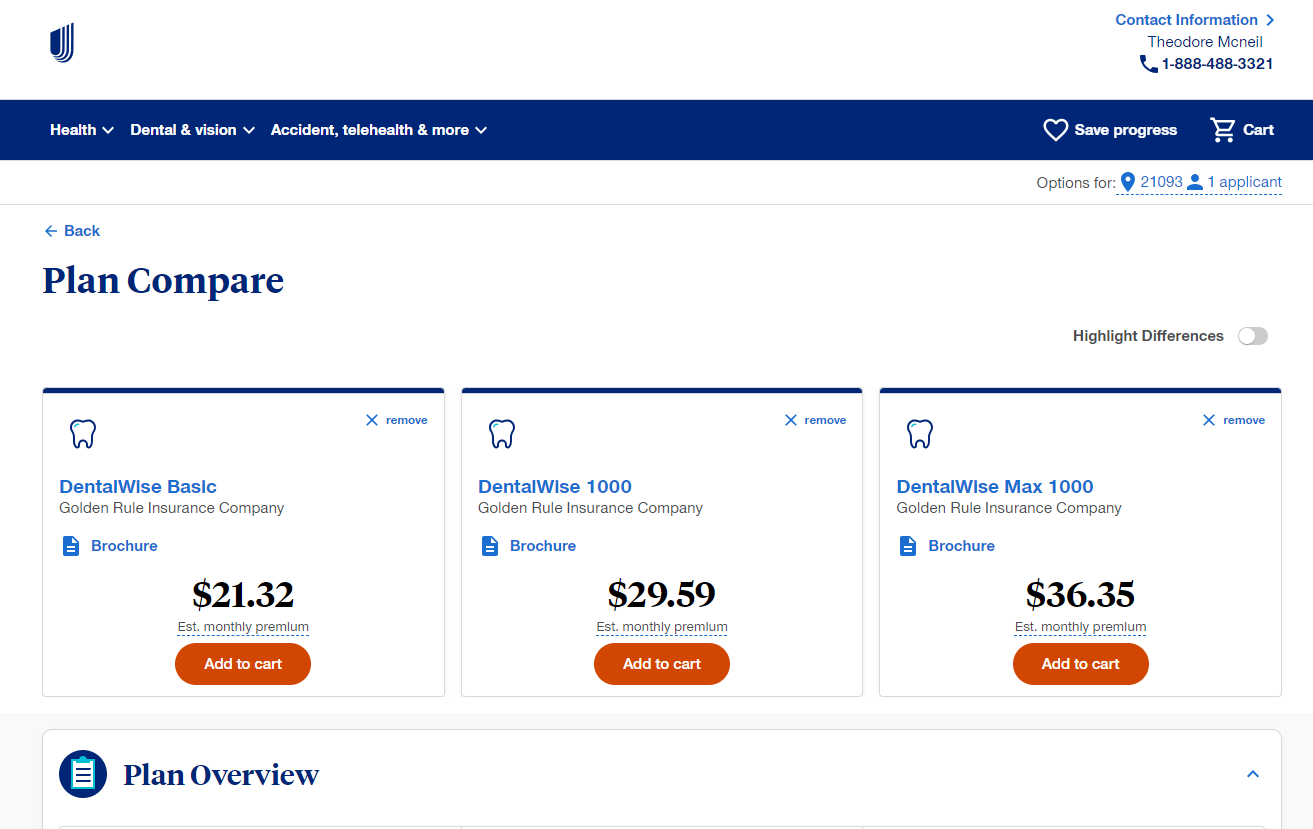
RELATED PRODUCTS:
- Philips Sonicare 4100 Electric Power Toothbrush ($40-$50)
- DenTek Mouth Guard for Nighttime Teeth Grinding ($20)
- Oral-B iO Series 5 Rechargeable Electric Toothbrush ($100-$120)
Information is meant to be accurate and educational and not intended to be legal, medical or financial advice. Be sure to do your own research and contact a professional for help. Our site is free to use, but we may receive a commission from our partners & advertisers at no additional cost to you. Read our disclosure for more information.
Licensed insurance broker helping individuals, families and small business owners get affordable benefits.
